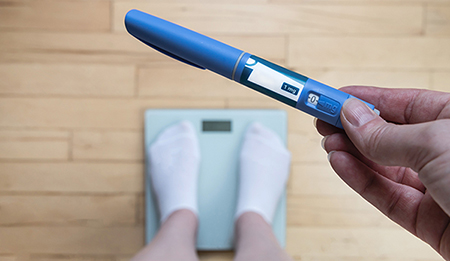Ask an Expert: Weight Loss Surgery or Medication?

Losing weight is rarely easy, and there’s no one-size-fits-all solution. Weight loss medications and weight loss surgery can both help people lose weight and lead healthier lives.
“Weight loss medications like Ozempic/Wegovy and Mounjaro/Zepbound are game changers, not only for weight loss but for diabetes and heart disease,” explains Thien Nguyen, MD, medical director of Metabolic and Bariatric Surgery at Overlake Medical Center & Clinics. “Many people don’t realize that they’re two sides of the same coin: Weight loss surgery works in part because certain hormones increase after surgery. And these new medications mimic those same hormones.”
When is Weight Loss Medication the Best Solution
Weight loss medication is typically best for people who aim to lose around 10-20% of their body weight. If they need to lose more, it’s best to consider medication and surgery together.
Some weight loss medicines work by mimicking natural hormones that help you feel full sooner and eat less (GLP-1 medications). Others work by helping your brain control your appetite (non-GLP1 medications).
Benefits of Weight Loss Medication
- Weight loss without surgery.
- Appetite/craving control.
- Improvement in weight-related health conditions including Type 2 diabetes, heart disease, fatty liver, sleep apnea.
Considerations with Weight Loss Medication
Some people experience side effects like nausea, vomiting, diarrhea and dizziness.
Medications may not be covered by insurance. Out-of-pocket costs average $25-$100/month for non-GLP-1s and $500-$1600/month for GLP-1s.
Many people regain weight when they stop taking medication.
Medications work best when patients stay involved with a weight loss program and their medical team.
“I always recommend trying weight loss without surgery first,” Dr. Nguyen said.
When to Consider Weight Loss Surgery
Weight loss surgery is typically best for people aiming to lose more than 20% of their body weight.
Surgical weight loss procedures, such as sleeve gastrectomy or gastric bypass, work by reducing portion size, reducing calories the body absorbs and increasing the same hormones weight loss medicines mimic so people experience less hunger/craving.
“Many surgical candidates have tried other approaches and not met their weight loss goals,” Dr. Nguyen said. “They may also consider surgery because they don’t want to be on weight loss medication indefinitely."
Benefits of Weight Loss Surgery
- More effective for long-term significant weight loss.
- Often resolves many weight-related conditions like Type 2 diabetes, hypertension, fatty liver, sleep apnea, joint pain.
- Reduces risks of cancer, stroke, heart attack. Patients live longer.
- There is no risk of losing access or running out of the “medicine” with surgery – it can’t be taken away.
Considerations for Weight Loss Surgery
- It may not be covered by insurance. Without insurance, cost ranges from $22,000-$26,000.
- Like all surgeries, there is a small risk of complications.
- Surgery works best when people also stay involved in a weight loss program with their medical team.
Deciding What is Right for You
Dr. Nguyen wishes more people knew one thing about weight loss: Exercise is important, but lowering calorie intake is even more important.
“Studies show that calorie intake is about 10 times more important than exercise for losing weight,” Dr. Nguyen said. “It is why the new medications and surgery work — you feel full sooner and want to eat fewer calories. And, obviously, they don’t make people exercise.”
Overlake’s weight loss specialists are here to discuss all your options and build a weight loss plan that works for you. Learn more about Weight Loss Services at Overlake and read success stories.








